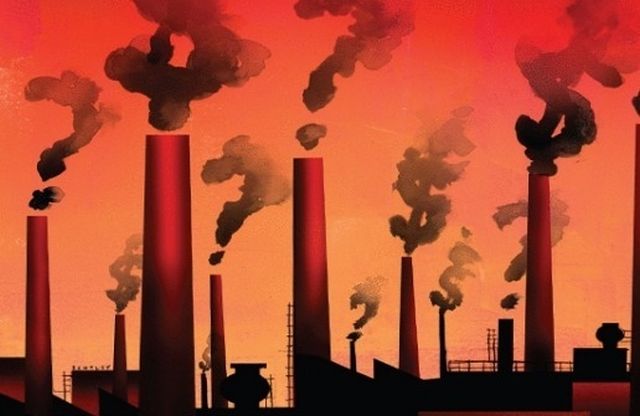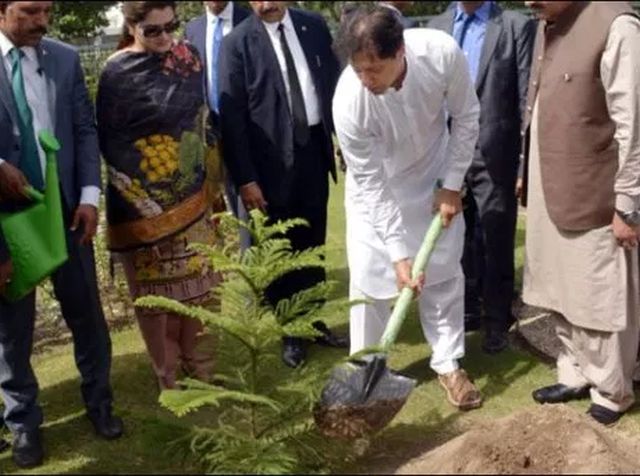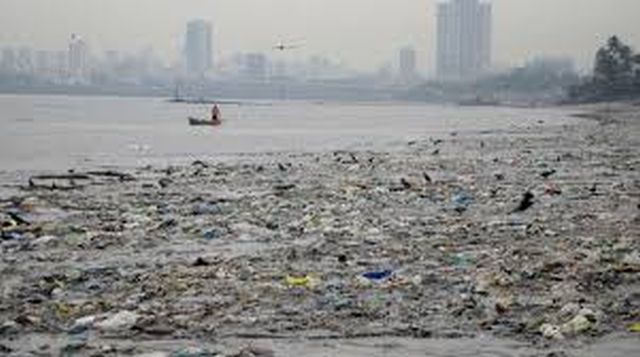
by admin | May 25, 2021 | Opinions
 By Rajendra Shende,
By Rajendra Shende,
Is humanity in peril due to climate change? The much-publicised underwater meeting of the Maldavian cabinet 2009, just about two months before the 15th UN Conference on Climate Change (COP 15), was deemed to have already responded to that question, albeit symbolically.
Maldavian ministers, led by then President Mohamed Nasheed, literally went down in the shallow waters off the island of Girifushi, one of the nearly 1,000 that make the Maldives most vulnerable to climate change. They then got down to the business of governance by communicating through hand gestures.
Some critics dismissed that meeting as a publicity stunt. Many in the diplomatic world, however, judged it a remarkable and bold gesture. It was considered a clarion call to global consciousness on issues that must be hammered out at the COP 15 in Copenhagen.
The most intense climate campaigner among the then Heads of State, Nasheed wanted to create awareness about not just the plight of the small-island countries in the wake of the rise in sea levels but also the extinction of life on Earth as hinted in the report of the Intergovernmental Panel on Climate Change (IPCC) that went on to win the 2007 Nobel Peace Prize.
Come 2018 — and three years after Paris Climate Agreement — COP 24 is now being held, literally, on top of one of Poland’s deep coal mines. It is yet not clear if it is another bold experiment by Poland’s young President, Andrzej Duda, to draw the attention of the international community to the darker side of the long and fatally flawed international efforts in addressing one of the deadly sources of climate change.
The conference is underway (December 2-14) in the region called the Upper Silesian Basin, known for the deep mines of lignite, hard and dirty coal. These are not just Poland’s largest operating coal mines, but the mine workers there are the key deciding factors in Polish politics.
The conference venue, Katowice, not far from Krakow where President Duda comes from, is in a busy mining area with strong political clout. The region is the home to the European Union’s largest coal producers. Needless to emphasise, ownership of these coal mines is not just Polish but other European countries as well. So, the roots of the mining are not only deep but, in a globalised world, have spread far and wide.
As if to broadcast the “reality-show” and to make the green movement extremely anxious, many of the events on the margins of COP 24 are financed by the coal-mining companies.
Until the affordable access to alternate fuel that provides similar employment and prosperity to Polish workers, sticking with coal is the only option for the Polish government. To hammer home the point, the government recently announced it is planning to invest in the construction of a new coal mine in Silesia.
By selecting it as venue for COP 24, Poland is making audacious efforts to raise global consciousness and awareness on the stark ground reality of the global war to tackle one of the greatest challenges of our times. A positive message from Katowice and the Upper Silesian basin is that the world needs to eliminate coal through techno-political-social solutions and not just through “clean coal”-like soft technological options.
What is the stark and dark reality? Nearly 80 per cent of the electricity in Poland is derived from coal. Globally, coal is the single-largest contributor to the Green House Gas (GHG) emissions, in this case carbon dioxide. On a weight-by-weight basis, coal produces 30 per cent more GHGs than oil and 50 per cent more than natural gas. It is also the major contributor to air pollution that is now a life-threatening menace in the urbanised world.
Coal mining is also a significant source of emission of methane, which has even more global-warming potential than carbon dioxide. Widespread use of lower quality coal to heat homes, especially in the colder months, has led to smog and respiratory illnesses in Poland’s southern cities, as in many emerging economies like India and China.
So, this black gold is now called dirty and anti-environmental in all its characters. But historically, coal has been serving humanity for ages for heating, cooking, steaming, lighting, manufacturing and electrifying. It was instrumental in triggering and spreading the industrial revolution that started with steam engines in the mid-18th century and has provided direct and indirect employment to billions.
To be fair, Poland is not the only country that uses coal to meet a major part of its energy needs. Globally, 40 per cent of the energy is produced by burning coal. China, India, the US are the three largest emitters of GHGs, most of which come from coal. In the US, the fracking revolution has in recent years reduced the use of coal for electricity to 30 per cent.
So, will delegates from all over the world to COP 24 get the symbolic message of President Duda in hosting the Climate Conference of world leaders on top of a coal mine?
(The author is Chairman TERRE Policy centre and former director UNEP. The views expressed are personal. He can be contacted atshende.rajendra@gmail.com)
—IANS

by admin | May 25, 2021 | News, Politics
 New Delhi : Prime Minister Narendra Modi on Sunday said that only refraining from war cannot ensure peace. Instead, there is a need for “united universal cooperation” to combat terrorism, climate change and for economic development and social justice.
New Delhi : Prime Minister Narendra Modi on Sunday said that only refraining from war cannot ensure peace. Instead, there is a need for “united universal cooperation” to combat terrorism, climate change and for economic development and social justice.
Modi made the remarks in his monthly radio programme “Mann Ki Baat”, ahead of November 11 – the day when World War I ended a hundred years ago.
Modi said India had no direct connection with the War but it was an important event because Indian soldiers fought bravely and sacrificed their lives.
“The world witnessed a dance of death and devastation during the World War I. Around one crore soldiers and almost the same number of civilians lost their lives. This made the whole world realise and understand the importance of peace.
“The definition of peace has changed in the last hundred years.
“Today, peace does not only mean ‘no war’. There is a need to work unitedly to address issues such as terrorism, climate change, economic development to social justice through universal cooperation and co-ordination. Development of the poorest of the poor is the real indicator of peace,” Modi said.
On climate change, the Prime Minister said people only have to look back at the glorious past and the rich traditions for remedial action and have to understand the lifestyle of the tribal communities who live in consonance and in close coordination with nature.
“The tribal community believes in very peaceful and harmonious co-existence but if somebody tries to harm and cause damage to their natural resources, they do not shy away from fighting for their rights,” he said.
Modi cited the example of Gurbachan Singh, a farmer from Punjab who during the marriage of his son, told the bride’s father to promise him not to burn stubble in their fields.
He mentioned about the farmers of Punjab’s Kallar Majra who are mixing the stubble with the soil by ploughing their fields rather than burning. “A small constructive step plays a vital role in creating a positive environment.”
Modi recalled Sardar Vallabhbhai Patel’s contribution in keeping India united and said the nation will pay him tributes on his birth anniversary on October 31 by inaugurating his world’s tallest skyscraping statue.
Lauding the performances of Indian sportspersons in the Asian Para Games and Summer Youth Olympics, he said the country was setting new records not just in the field of sports but also in “uncharted areas” and stressed on the “4S” — spirit, strength, skill and stamina — as key elements in the field of sports as the core foundation of the nation.
Recalling the successful organisation of the FIFA Under-17 World Cup in 2017, Modi said India was hosting the Men’s Hockey World Cup 2018 in Bhubaneswar between November 28 and December 16.
Mentioning about ‘Self 4 Society’ portal which has been launched with a view to motivate employees of IT companies for social activities, Modi said their dedication and vigour can make every Indian feel proud.
The Prime Minister congratulated Sikkim for winning the prestigious Future Policy Gold Award, 2018 for encouraging the sustainable food system and said the northeast region has made grand progress in organic farming.
—IANS

by admin | May 25, 2021 | Opinions
 By Amit Kapoor,
By Amit Kapoor,
In a curious happenstance last week, two global events put the spotlight on the critical issue of climate change.
First, the United Nations’ scientific panel on climate change issued a landmark report which painted a far more ominous picture of the consequences of climate change and called for a transformation of the global development scenario at a speed and scale that has “no documented historic precedent”. It warned of the catastrophic effects that await the world if net global carbon emissions are not cut in half over the next dozen years and eliminated completely over the next three decades.
As if in response, the next day the Royal Swedish Academy of Sciences awarded the Sveriges Riksbak Prize in memory of Alfred Nobel to two American economists; one of whom, William Nordhaus, was accorded the recognition for his path-breaking work on carbon pricing.
The UN report focuses attention on the fact that if status quo is maintained and greenhouse gas emissions continue at the present rate, the world will warm up by 1.5 degree Celsius above preindustrial levels by 2040, inundating coastlines and intensifying droughts in the process. All the previous work had estimated the repercussions of climate change based on a higher temperature rise of 2 degree Celsius, which was considered to be the threshold for the most severe effects. Now, there is new evidence that these effects will be realised much sooner.
According to the report, despite the international community coming together to strengthen the global response to climate change, in the form of commitment to the Kyoto Protocol or the Paris Agreement, the scale and speed needed to stabilise global temperature at a safe level has not been achieved yet.
Nordhaus’ work has gained more relevance as it provides an answer to why heavy-handed regulations are unable to correct the market failure. By doing so, his research can guide policymakers on how to tackle climate change.
He has built on the work done in the 1920s by A.C. Pigou. His research points out that individuals, firms and countries have no incentive to reduce carbon consumption as climate is a global public good. This points towards a clear case of market failure where intervention is needed to restore efficiency and enhance public welfare. The interventions can be in the form of taxes or regulations.
His research shows that direct government regulations aimed at controlling the quantity of carbon emissions will be far less effective than putting a price on the use of fuels. This happens because, without an incentive, polluters will act as free-riders and not take into account the economic damage inflicted on the society due to their actions. Their failure to internalise these costs leads to emissions greater than the optimal level.
He argues that carbon pricing will be an effective policy measure, because when companies are made to pay the price for their fossil fuel consumption they will find cost-effective and innovative solutions for reducing them. The policy will incentivise them to invest and develop energy-saving technologies.
In theory, economists have always been enthusiastic about billing polluters for every tonne of emission they unleash, arguing that the polluters can choose their optimal response given the price. However, in the real world, the road to successful emission reduction has involved heavy-handed government regulations. This happens because of two reasons.
First, when governments put a price on carbon, either through a direct tax or through a cap-and-trade programme, they are unable to put a price that is significant enough to drive a reduction in carbon emission. For instance, the World Bank’s carbon pricing dashboard shows that there are 51 carbon pricing initiatives that are either implemented or scheduled for implementation across the world whose total value is $81.68 billion. But experts suggest that in most of the programmes the prices are too low to spur emission reductions or to inspire low-carbon investments.
Second, government regulations are a safer political bet as high taxes can face a political backlash. For instance, the Australian government’s plan of reducing emissions by using a cap-and-trade programme was successful, but it faced a backlash from industrial groups and voters. The party that came to power in the next elections repealed the programme.
So, theoretically, a higher price on the use of fuel is the solution, but political factors reduce the possibility of its implementation. If one thinks that public acceptability is a deterrent, then policymakers should focus on bridging the information gap that exists across citizens. They should also address the issue of allocation of revenue from carbon pricing, wherein the collection should be streamlined to cater to environmental concerns of the economy. This will enhance public acceptability and the ability of policymakers to implement carbon pricing.
(Amit Kapoor is Chair, Institute for Competitiveness. The views expressed are personal. He tweets @kautiliya and can be contacted at Amit.Kapoor@competitiveness.in).
—IANS

by admin | May 25, 2021 | Muslim World
 Islamabad : Pakistan on Sunday kicked off the “Plant for Pakistan” campaign by Prime Minister Imran Khan who in the drive planted a sapling in the country’s Khyber-Pakhtunkhwa province.
Islamabad : Pakistan on Sunday kicked off the “Plant for Pakistan” campaign by Prime Minister Imran Khan who in the drive planted a sapling in the country’s Khyber-Pakhtunkhwa province.
The campaign “Ten Billion Trees Tsunami” aims at combating the effects of climate change by planting over ten billion trees across the country during the five-year tenure of the current government.
After planting the sapling, the prime minister took to twitter to motivate people to plant trees. “Today we launch our tree plantation drive #Plant4Pakistan across the entire country. I want everyone to join this #GreenPakistan drive so we can counter the twin threats of climate change and pollution confronting our future generations,” the Prime Minister tweeted.
Khan’s advisor on climate change Malik Amin Aslam said that trees were planted and distributed freely across the whole country with an objective to motivate the general public to make Pakistan greener.
An estimated 1.5 million trees will be planted in the first phase in various cities of the country including the capital city Islamabad, by students, government employees, workers of Imran Khan’s political party Pakistan Tehreek-e-Insaf and volunteers.
—IANS

by admin | May 25, 2021 | Business, Emerging Businesses
 By Vishal Gulati,
By Vishal Gulati,
Da Nang (Vietnam) : Playing a crucial role to mitigate climate change and other environmental challenges across the globe, India on Tuesday announced it will increase for the next four years the money it pays to the Global Environment Facility (GEF), a mechanism to provide grants for environment projects.
India’s representative to GEF Council Aparna Subramani made the announcement at its meeting in this Vietnamese city that will conclude on June 28.
Subramani, who represents India in the World Bank and a representative of Bangladesh, Bhutan, Maldives, Nepal and Sri Lanka, besides her home country in the GEF Council, told the gathering that India has decided to increase its commitments from $12 million to $15 million to the GEF’s new four-year investment cycle, known as GEF-7.
GEF CEO and Chairperson Naoko Ishii, who opened the GEF council meeting on June 24, thanked India for increasing its financial support, which will go to other developing countries to deal with urgent environmental crises.
Subramani also said at the council meeting that NGOs getting money for GEF projects should not remain the same over years. This point was immediately supported by the delegate from Argentina.
The GEF Council is meeting two months after governments, in a demonstration of confidence, approved a $4.1 billion replenishment of GEF-7.
GEF, established on the eve of the 1992 Rio Earth Summit to help tackle the planet’s most pressing environmental problems, has provided $17.9 billion in grants and mobilised an additional $93.2 billion in financing for more than 4,500 projects in 170 countries.
India, among the world’s most vulnerable countries to climate change, is both a donor and a recipient of GEF, an international partnership of 183 countries.
The GEF Council will be followed be the sixth GEF Assembly (June 27-28), which meets every four years, and is expecting 1,200 participants, including heads of state, environment ministers, UN, NGO and business leaders.
(Vishal Gulati is in Da Nang for the Internews’ Earth Journalism Network Biodiversity Fellowship Programme at the Sixth Global Environment Facility (GEF) Assembly. He can be reached at vishal.g@ians.in)
—IANS





